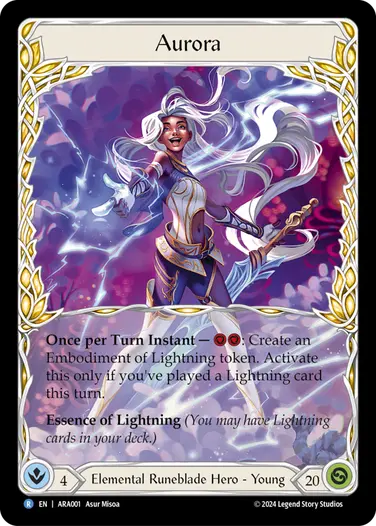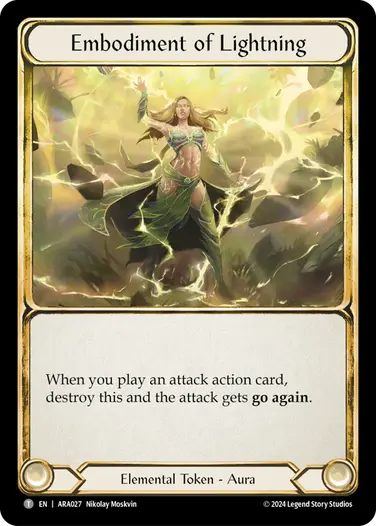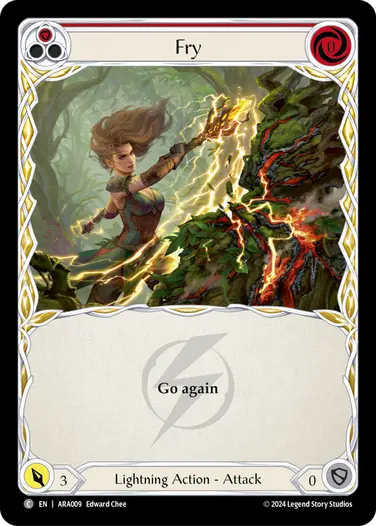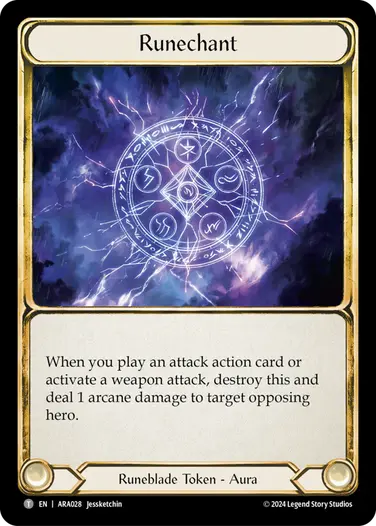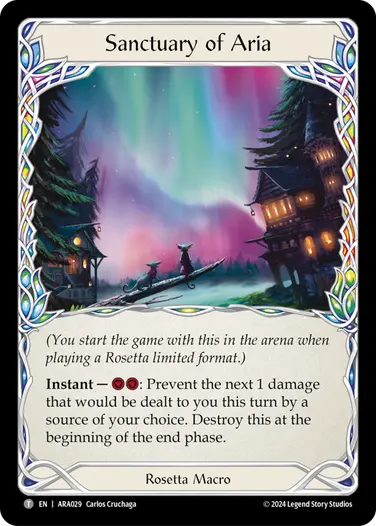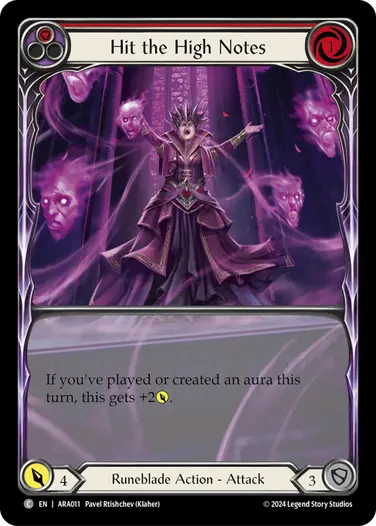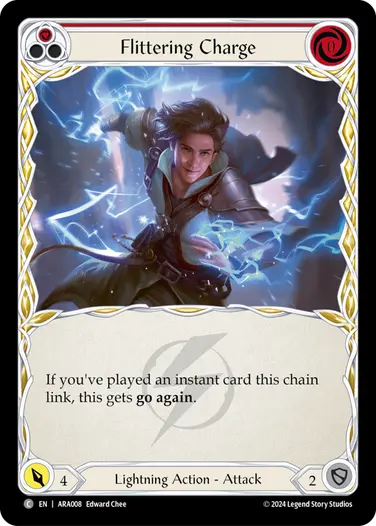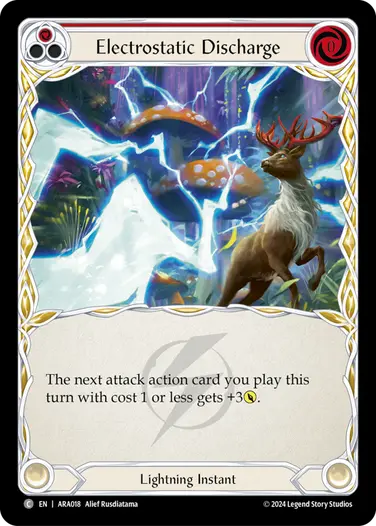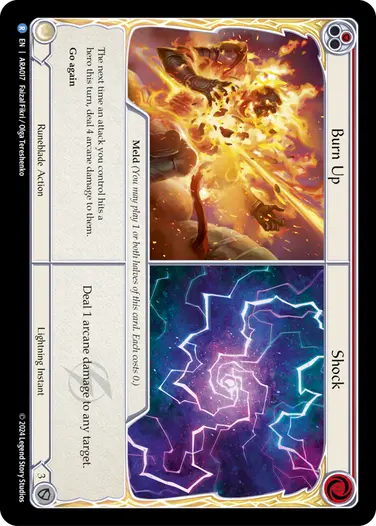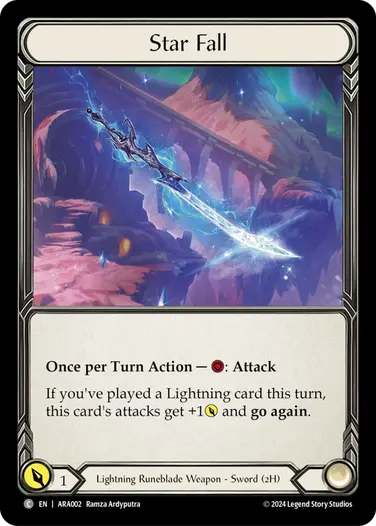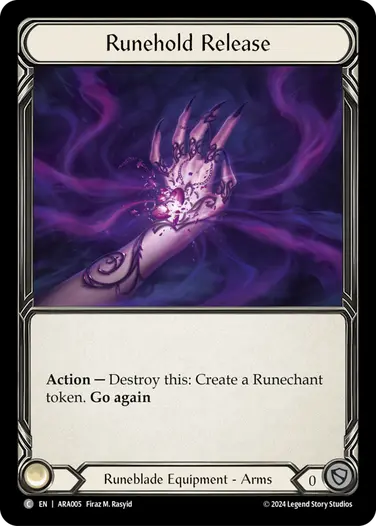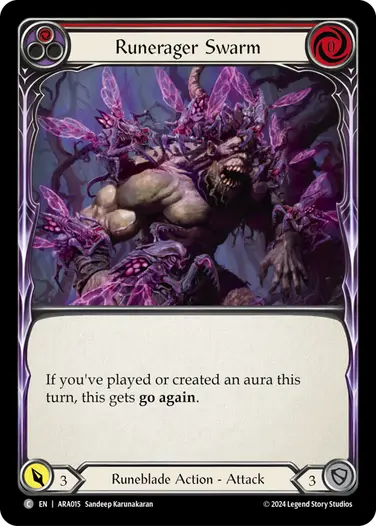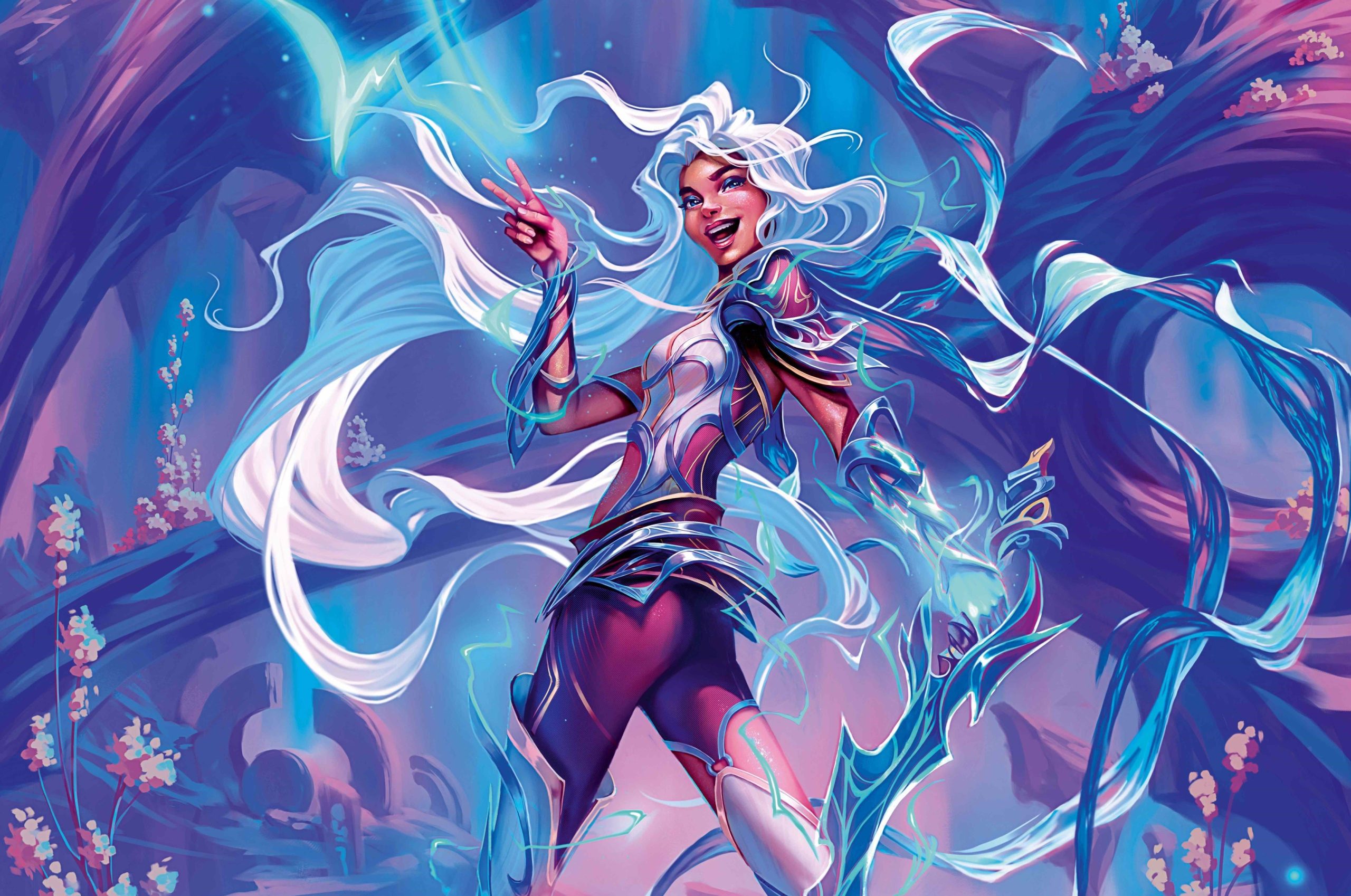Aurora is an Elemental Runeblade imbued with the power of Lightning! She strikes several times in a turn, finishing off her opponents with an unstoppable combined onslaught of physical and arcane damage!
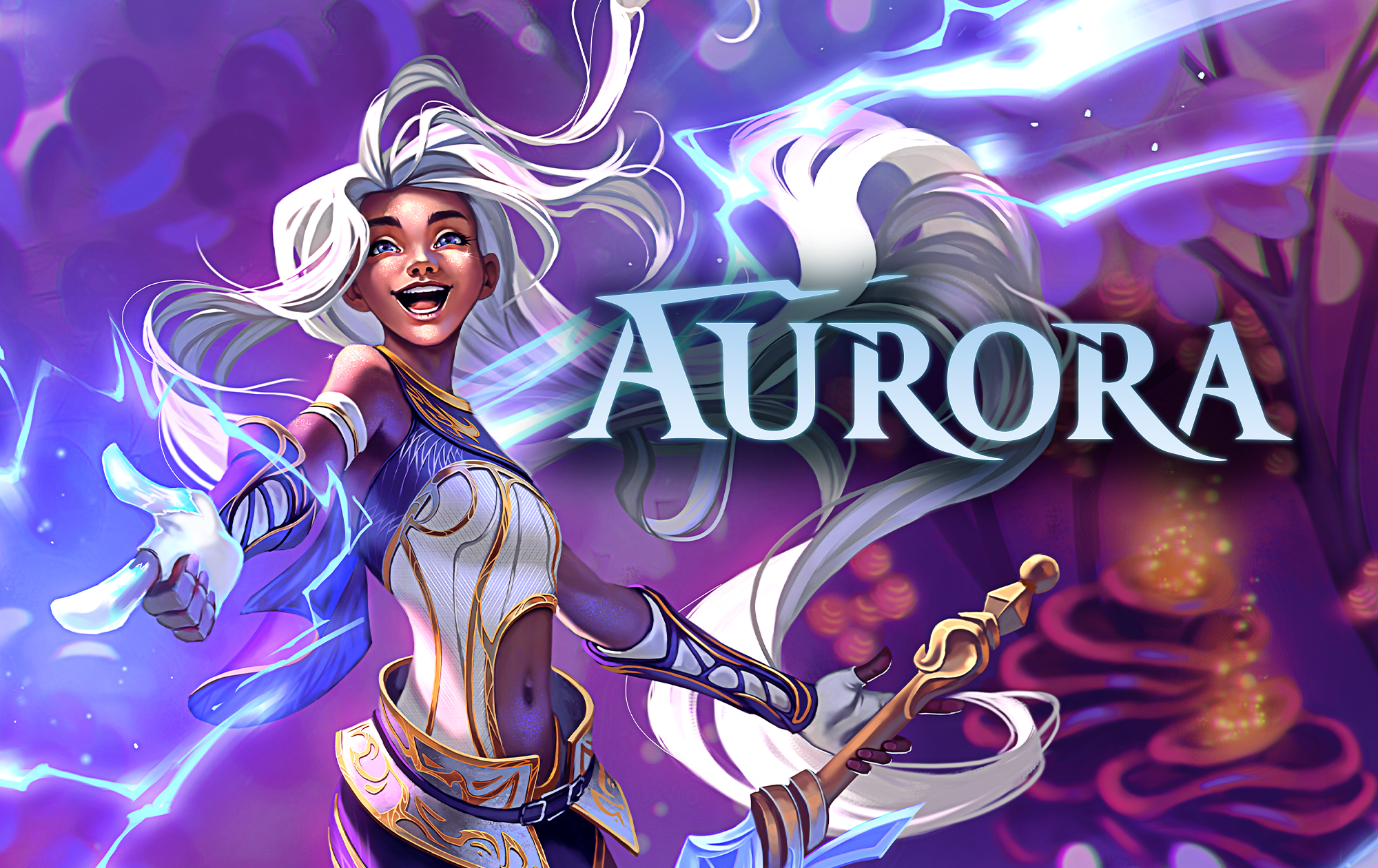
How to Play Aurora
Many of Aurora’s cards have go again, allowing her to play multiple attacks in a turn, but some have other strengths instead, such as increased power or arcane damage. To keep up momentum, Aurora relies on her hero ability, creating Embodiment of Lightning tokens, which give go again to these attack action cards that don’t already have it. This allows her to build wide combat chains and pressure the opponent into defending.
In order to create an Embodiment of Lightning, you need to play a Lightning card first. Lightning cards can be identified by their yellow border pattern and Lightning symbol in the card text. Aurora’s hero ability is an instant (more on this card type later), which means you can activate it any time during the turn you’ve played a Lightning card, even if that card didn’t have go again. You should try to activate Aurora’s hero ability whenever you get the chance, because without it her turns are much slower.
An Embodiment of Lightning will automatically be used on the next attack action card you play, whether that’s during the same turn you made the Embodiment of Lightning, or the first attack action card you play on the following turn. Cards that already have go again can’t get go again twice, so if you have an Embodiment of Lightning, make sure to play one of your attack action cards that doesn’t have go again first, otherwise you’ll waste the Embodiment of Lightning on an attack that doesn’t need it.
Arcane 101
Aurora is a hybrid fighter with access to both physical and arcane damage. Arcane damage is a special form of damage that can’t be defended by regular means. Aurora mainly deals arcane damage through Runechants, which are special tokens that stick around until you attack, then they self-destruct and each deal 1 arcane damage to the opponent. Arcane damage is often difficult or inefficient to prevent, so Runechants are a strong way to win a game once you get your opponent’s life low enough.
Stopping your opponent’s arcane damage is a little trickier. You start the game with Sanctuary of Aria, a special token that allows you to pitch 2 resources to stop 1 point of damage, regardless of type. You can activate this multiple times in a turn, but once that turn is up, your safety net is gone! Due to the high cost of preventing arcane damage, most of the time you’ll want to use Sanctuary of Aria on the very first turn when you’re going second, or as a last resort. Other cards, like Trip the Light Fantastic, can discard themselves to prevent damage. Often, the best solution is just to take out the opponent before they get the chance to deal lethal damage.
You’ll notice that both Embodiment of Lightning and Runechants are auras. Auras are a type of card that stay in the arena when played or created, until an effect makes them leave. Some key cards in your deck, such as Hit the High Notes, require you to play or create an aura in order to unlock their bonus effects. You can time Aurora’s hero ability either before you play Hit the High Notes (to give it go again) or after you’ve played Hit the High Notes (to save the Embodiment of Lightning for your next turn). Sometimes you can even catch your opponent off guard by using Aurora’s ability after your opponent has defended Hit the High Notes but before damage is dealt!
Tricky Stuff
Some cards in your deck are ‘instants’ or have abilities with the word ‘instant’ on them. Instants can be activated on either player’s turn, and don’t use up your action point. This gives you a lot of flexibility with the timing of your cards, but remember that your opponent might also respond with instants of their own! Some examples of instant speed plays you may come across in the Aurora Blitz Deck are:
- Attacking with Flittering Charge, then after your opponent has defended, playing the instant Sigil of Lightning, which turns on Flittering Charge’s go again!
- Going second, when your opponent attempts to end their turn, playing the instant Electrostatic Discharge, then activating Aurora’s ability to make an Embodiment of Lightning – all before you draw up for your first turn!
- Playing the Shock half of Burn Up // Shock on your opponent’s turn in response to their lethal damage to kill them first!
Now let’s talk about that weird sideways card in your deck. Split-cards are a new type of card introduced in Rosetta, which are essentially two cards in one! You are allowed to play either half, or if it has the keyword meld, you can play both. If you choose to play both halves, you need to pay the resource cost separately for each half. Luckily, Burn Up // Shock costs 0, and paying 0 twice is still 0!
When you play both halves of a split-card, they resolve right-to-left. This means if you play both halves of Burn Up // Shock, the Shock happens first, then the Burn Up. Note that only the Shock half is a Lightning card, so if you chose to play only the Burn Up half, you wouldn’t be able to activate Aurora’s ability without playing another Lightning card.
Lastly, each half of a split-card can only be activated if the game rules allow it. This means that even though Shock is an instant, you can’t play Burn Up during your opponent’s turn because it’s an action that needs to be played during your action phase.
How to Win with Aurora
Aurora wins by playing aggressively, but is a very different hero when you don’t have an Embodiment of Lightning in play. Think carefully about whether you should spend your resources activating Aurora’s hero ability or spending them on more damage such as an attack with Star Fall. It can feel great to push a wide turn and use every pitched resource efficiently, but if your following turn is just a single attack it can be like running at breakneck speed into a brick wall.
On the other hand, saving an Embodiment of Lightning every single turn can be quite demanding on your resources, sometimes it pays to use it the same turn you create it, often alongside an extra attack in arsenal and an Embodiment of Lightning from the previous turn. Thinking about your next turn is just as important as thinking about the current turn. For example, Runehold Release is an important equipment to save for a turn where you don’t draw any Lightning cards, as it enables the effects of Runerager Swarm, Meat and Greet, or Hit the High Notes.
Often the best way to close out a game with Aurora is with a combination of physical and arcane damage to leak through your opponent’s defenses. Always play with the goal of lowering life totals rather than preserving cards in deck, as the quicker you can get the opponent to single digits, the easier it will be to deal lethal damage. Burn Up // Shock is a premium card to save in arsenal for the late game, as the threat of 4 arcane damage can make your 4-power attacks impossible to deal with.
